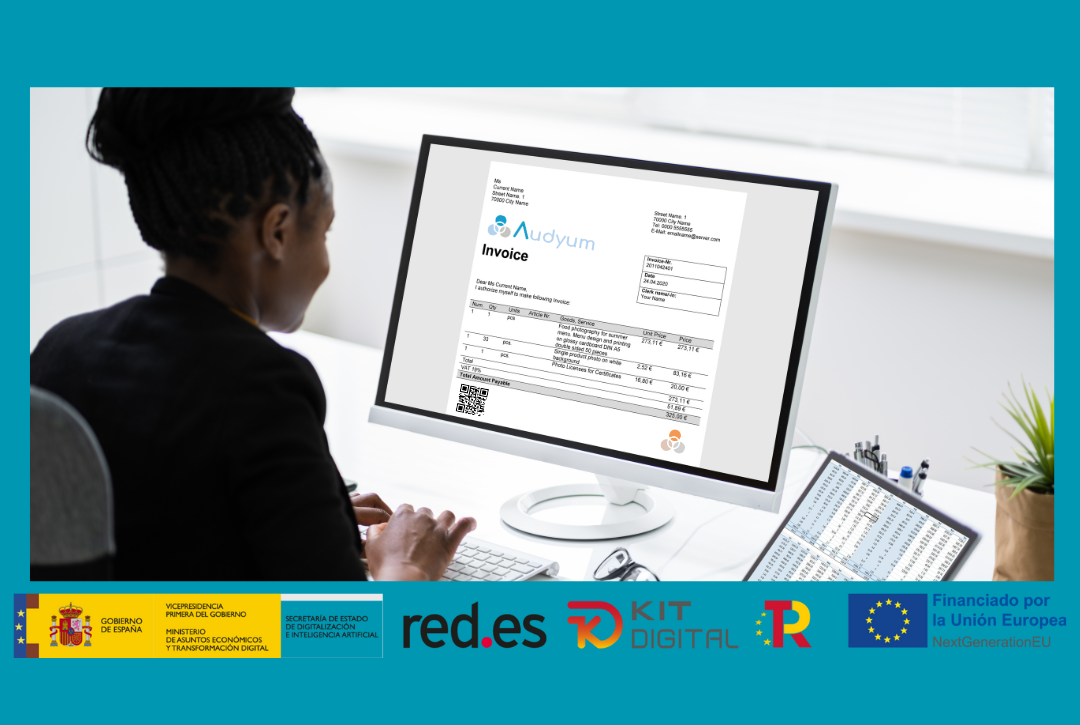Electronic Invoicing: How It Works and How It Affects You
Electronic invoicing is becoming increasingly mandatory for freelancers and businesses in Spain. With the Crea y Crece Law and the implementation of VeriFactu, digital invoicing is no longer an option—it’s an imminent requirement. If you haven’t made the transition yet, this article will help you understand what it means, how it affects your business, and how you can take advantage of the Digital Kit and Audyum to adapt smoothly.
📌 What Is Electronic Invoicing and Why Is It Important?
Electronic invoicing is the digital equivalent of a paper invoice, but with some key differences:
- It must be generated in a structured format to ensure authenticity and integrity.
- It is already mandatory for transactions with the public sector and will soon be required in the private sector.
- It allows real-time submission to the Tax Agency through the VeriFactu system.
- It reduces errors, improves traceability, and combats tax fraud.
In the European Union, over 85% of countries have already implemented electronic invoicing regulations, and Spain continues to move forward in this process.
📅 When Will Electronic Invoicing Be Mandatory in Spain?
Although the Crea y Crece Law has already established the obligation of electronic invoicing, its implementation depends on additional regulations. According to official sources from the Government and the Tax Agency:
- Businesses and freelancers with an annual turnover exceeding €8 million must implement it before March 29, 2024.
- VeriFactu will be mandatory starting July 1, 2025.
- Other freelancers and businesses must adapt before VeriFactu comes into effect.
⚠️ Challenges and Benefits of Electronic Invoicing
🔴 Challenges for Freelancers and Businesses
- Technological adaptation: If you’re not using compatible invoicing software, you’ll need to upgrade.
- Regulatory compliance: Your system must meet the integrity and traceability standards set by law.
- Change in habits: Transitioning from paper to digital can be a challenge for some businesses.
✅ Key Benefits
- Greater efficiency in invoice and payment management.
- Reduction in administrative costs (no more printing and storing physical invoices).
- Fewer errors thanks to automation.
- Compliance with regulations, reducing the risk of penalties.
- Enhanced security and fraud prevention through digital traceability.
💡 How to Prepare? Get Audyum with the Digital Kit!
Transitioning to electronic invoicing doesn’t have to be complicated. Thanks to the Digital Kit, if you’re a freelancer or SME, you can receive funding to implement Audyum, a compatible invoicing software that optimizes your clinic’s management without upfront costs.
What Does the Digital Kit Cover?
- Access to our application, a tool that simplifies electronic invoicing and patient management.
- Full compliance with regulations and integration with VeriFactu.
- Automation of key processes in audiology clinics to save time and reduce errors.
- Training and support to ensure you get the most out of the system.
Our Company is a Digitalization Agent
As an official Digitalization Agent, we can help you implement Audyum and transition to electronic invoicing using the Digital Kit. If you haven’t applied for your grant yet, we’ll guide you through the process so you can benefit from this subsidy and optimize your clinic’s management effortlessly.
🚀 It’s Time to Digitalize Your Invoicing!
Electronic invoicing is not just a legal requirement—it’s also an opportunity to streamline your business operations. The sooner you adapt, the smoother the transition will be. Don’t wait until the last minute to make the switch!
Ready to Take the Next Step?
Book a free demo of Audyum and discover how we can help you manage your invoicing effortlessly.
For more information, check official sources:
⚠️ Important Note: This Service is Available Only in Spain
The Digital Kit and the mandatory electronic invoicing regulations discussed in this article apply exclusively to businesses and freelancers operating in Spain. If you are outside Spain, please consult your country’s regulations regarding electronic invoicing.
